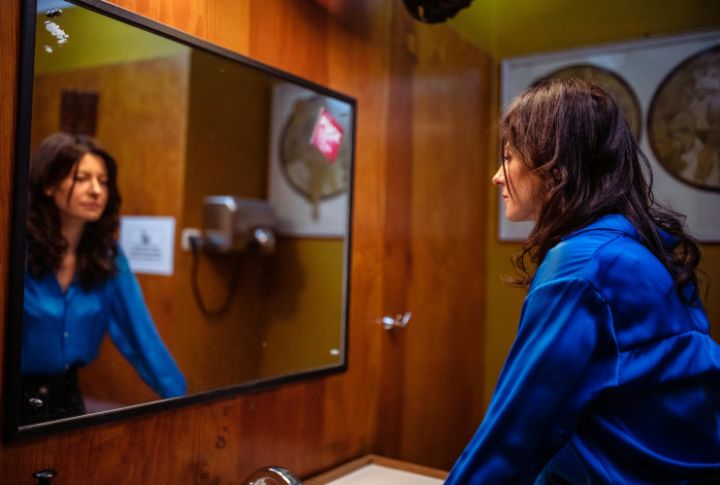
You know that feeling when you’re counting hours instead of achievements? Many workers live that rhythm every day, moving through tasks without much meaning attached. Over time, the job that once felt fine begins to feel heavy. But the signals aren’t always clear. Here, we explore the patterns and small choices that often reveal when someone’s struggling silently through their workdays.
Going Quiet

When a typically chatty colleague starts retreating into silence, their personal struggle ripples throughout the workplace ecosystem. This sudden withdrawal also creates a noticeable void in team dynamics and disrupts the natural flow of communication that keeps workplaces healthy and productive.
Dodging Lunch

Lunchtime tells its own quiet story. The coworker who once filled the table with conversation now eats alone, sits behind a screen, or heads out “just to clear their head.” What looks like needing space is sometimes emotional distance forming in real time.
Watching The Clock

Frequent time-checking is one of the most common signs of disengagement. Employees experiencing burnout always perceive the day as dragging, reflecting mental fatigue rather than poor time management. With time crawling by, enthusiasm has already packed up and left the office.
Making Little Mistakes

When small mistakes start creeping into their work, it’s rarely a sign that someone isn’t capable. They were doing just fine last month, right? It actually signals a mind that’s distracted and a sense of purpose that’s starting to fade. Basically, their engagement has started to drift away.
Showing Up Late And Leaving Early

Punctuality used to be their strong suit. Now it’s “flexible,” a polite word for gone. Late starts blend into the week, quiet proof that routine has shifted, and early exits signal freedom and distance. They still show up, just not all the way.
Long Bathroom Breaks

Every office has one: the person whose bathroom breaks could qualify as intermissions. It’s easy to joke about, but those quiet disappearances usually aren’t about idleness at all. When work feels heavy, even the hallway starts to look exciting.
Fake Smiling

Their words say “Great!” while the tone quietly pleads for relief. That’s surface acting—performing positivity on autopilot. Each emoji keeps its grin, though the energy behind it has thinned out. Somewhere between Slack messages and small talk, their genuine enthusiasm slipped away.
Saying Sorry

These people bump into someone and apologize as if they caused a global incident. Over-apologizing for every tiny slip again and again is anxiety in disguise rather than politeness at this point. “Sorry” becomes a sign they’re walking on emotional eggshells at work.
Requesting More Remote Or Hybrid Days

When work feels tense or relationships get uncomfortable, unhappy employees will start finding ways to keep their distance. It usually begins with extra requests to work from home and can slowly turn into more frequent absences and disengagement.
Hiding Out Behind “Busy Work”

You’ve met the spreadsheet artist—the one tackling “urgent” tasks no one assigned. Their calendar’s full, their impact isn’t. When real collaboration feels like too much, rearranging data becomes the safest and easiest way to look engaged while staying comfortably invisible.
Using Vague Answers

When someone’s struggling, it sets off a chain reaction. Stress makes talking harder, so questions about how they’re doing get met with quick deflections or topic changes. Those vague answers leave managers guessing, and the help that’s needed never quite lands where it should.
Showing Up Underdressed

Yesterday’s sharp dresser now looks like they wrestled their laundry pile and lost. Dressing down can be a quiet rebellion, a way to express frustration or disinterest without words. It might also suggest they no longer feel invested enough to put in the effort.
Running On Coffee And Nerves

While caffeine can be a harmless pick-me-up, relying on it to power through each day is a classic hallmark of someone barely keeping it together beneath the surface. These employees might appear alert and engaged, but their jittery energy signals emotional exhaustion.
Applying To Other Companies

Rising dissatisfaction often pushes employees to seek exits long before they announce them. Job boards replace project boards, and casual “career chats” become strategy sessions. These early moves signal declining commitment and growing emotional distance—the mind’s way of preparing to leave before the body does.
Nodding Through Accountability

Ah, yes, the enthusiastic nodder. They agree with everything, contribute nothing, and vanish by deadline. On the surface, they’re cooperative, but in practice? They’re buffering. When the nods multiply and results don’t, that’s not teamwork. Instead, it’s just burnout wearing a polite smile.
Refreshing Their Inbox

They’re not waiting on an important email; they’re praying for a distraction. Each inbox refresh is a mini escape from actual work. The odds of getting something meaningful are slim, but hey, for them it’s still more exciting than the project they’re ignoring.
Choosing Safe Busywork

You can spot the avoidance artist by their perfectly labeled folders and obsessively tidy desktop. Every file sparkles, yet deadlines gather dust. This pattern often stems from a lack of confidence or simply no longer caring about advancement. And it’s so subtle that it can go unnoticed for months.
Crying Between Deadlines

The restroom turns into the office’s unofficial therapy room. Eyes return red, smiles stitched back on. No one talks about it, because for everyone, they’re “fine.” That’s the professional thing to do, right? But they break the moment they stop pretending they can keep doing this forever.
Missing Meetings

At first, the missed meetings seem harmless. Then delays pile up, and “technical difficulties” become routine. The pattern is easy to miss yet impossible to mistake because in such cases, the team finds it hard to stay in sync when someone’s presence is just for show.
Overusing Sick Days Or PTO

While occasional time off is healthy and necessary, frequent absences might be an escape. For many secretly miserable employees, these breaks become coping mechanisms to recharge from the chronic stress that comes with a role that no longer aligns with their values.
